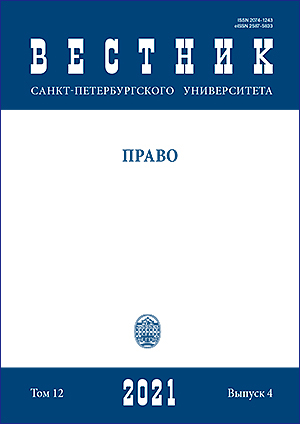Artificial intelligence and legal expertise in public administration
DOI:
https://doi.org/10.21638/spbu14.2021.404Abstract
The legal comprehension of artificial intelligence (AI) is at an initial stage, despite its history and practical applications. The purpose of the study is to assess the capacity of using AI for legal expertise in public administration. General legal expertise improves the quality of a normative legal act, anti-corruption expertise serves to reduce the propensity for corruption. The implementation of AI must be regulated, and a transparent certification system should be created. In public administration among the reference points for regulating AI, it is noted that the personal data-processing mode should take into consideration the specific features of each application of AI; the mode should be differentiated. The transparency of using AI should be indisputable. A particular complex issue for regulation is AI learning. Different types of expertise correspond to different lists of stakeholders and data-in-use. The application of AI for anti-corruption expertise will be most effective in relation to draft regulatory legal acts. AI is able to contribute to the legal certainty of an act, and AI anti-corruption expertise learning will reduce the number of participants in the process. To implement this, it is important to consider the following circumstances. Firstly, the ability to process big data affords the opportunity to “teach” AI in predicting corruption violations, which is important for anti-corruption expertise based on a modeled assumption. Secondly, special attention is required for AI learning in terms of expert subtleties in assessing legal certainty. Thirdly, the anti-corruption evaluation algorithm must be combined with existing classifiers of legal acts, glossaries. Anti-corruption expertise using AI makes it possible to minimize subjectivity, unify approaches in interpreting corruption factors, increase the overall quality of normative legal acts and meet legal and technical requirements under the condition of strict regulation of AI learning and usage.
Keywords:
expertise, artificial intelligence, corruption, legal security, digitalization, public administration
Downloads
References
Downloads
Published
How to Cite
Issue
Section
License
Articles of "Vestnik of Saint Petersburg University. Law" are open access distributed under the terms of the License Agreement with Saint Petersburg State University, which permits to the authors unrestricted distribution and self-archiving free of charge.






